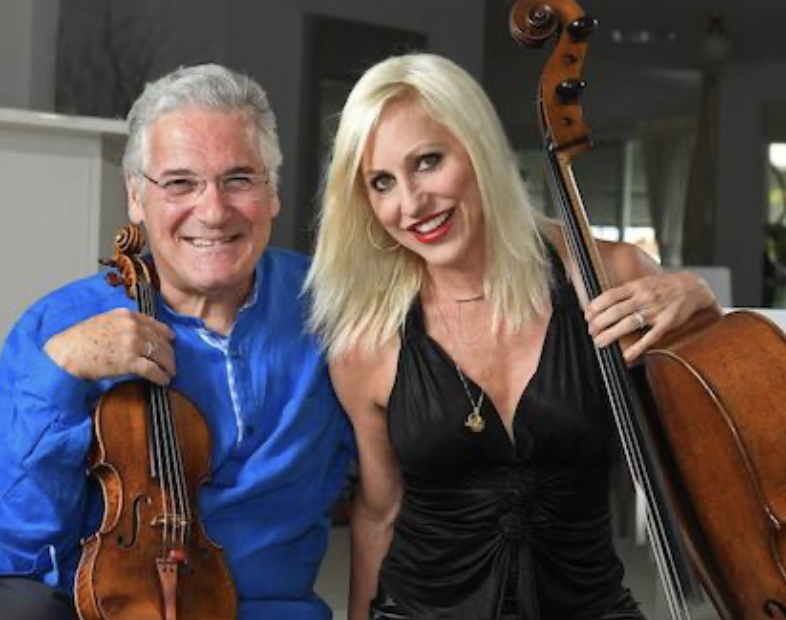|
Symphony
MYSTICAL PLANETS AND LIVELY GERSHWIN ORTIZ AT FINAL SRS CONCERT
by Peter Lert
Sunday, May 4, 2025
Symphony
VSO'S CONCERT MUSIC OF TIME, MUSIC OF PLACE
by Peter Lert
Sunday, April 27, 2025
Choral and Vocal
VOCAL ELEGANCE AND FIRE AT THE 222'S RECITAL APRIL 26
by Pamela Hicks Gailey
Saturday, April 26, 2025
CANTIAMO SONOMA SINGS AN INSPIRED GOOD FRIDAY MOZART REQUIEM CONCERT
by Pamela Hicks Gailey
Friday, April 18, 2025
DRAMATIC SHOSTAKOVICH SYMPHONY CLOSES PHILHARMONIC'S 25TH SEASON
by Terry McNeill
Sunday, April 13, 2025
LARGE COLLEGE OF MARIN AUDIENCE GREETS STOPHER ARTISTRY
by Terry McNeill
Saturday, April 5, 2025
Chamber
FRISSON DELIVERS SHIVERS OF DELIGHT
by Abby Wasserman
Sunday, March 30, 2025
OLD AND MOSTLY NEW IN SRS MARCH CONCERT IN WEILL
by Peter Lert
Saturday, March 22, 2025
Symphony
TWO FORMIDABLE SYMPHONIES AND PURPLE MOUNTAINS AT SRS CONCERT
by Peter Lert
Sunday, February 23, 2025
Chamber
THE PARKER CAPTURES DEMANDING ADES QUARTET AT RAC SEBASTOPOL CONCERT
by Peter Lert
Saturday, February 15, 2025
|
 |
 P. Zuckerman and A. Forsyth |
MUSICAL CALM IN A WORLD OF POLITICAL IDIOTS
by Terry McNeill
Friday, August 2, 2024
Just two pieces were on the Festival del Sole piano trio program Aug. 1 in Weill Hall, but they were a popular two – Mendelssohn’s D Minor and the Dvorák E Minor “Dumky,” Op. 90.
Violinist Pinchas Zuckerman led the proceedings with colleagues Amanda Forsyth (cello) and pianist Michael Brown. The Mendelssohn unfolded in a judicious tempo, with Ms. Forsyth initially underplaying the glorious two themes. Mr. Brown’s virtuosic playing was impressive, though from my seat at row L the acoustic picture could be muddy, a problem with small group sound in the hall and exacerbated by having just 300 in a big room that holds 1,420. String intonation was accurate.
Lots of unison playing characterized the lovely Andante, Mr. Zuckerman choosing a slightly reticent approach and playing the notes of the short minor key modulation in the middle that gave a sense of unease. The warm themes sang.
Elfin playing was heard in the popular Scherzo with light string staccato touch, perfect ensemble and Mr. Brown’s sparkling scale passages. The famous finale tempo was sufficiently fast with the piano line overpedaled, contrasting and changed
by an impassioned cantabile cello melody. After roaring to a close, the trio received a standing ovation.
After intermission, Mendelssohn’s classical tunes gave way to Czech folk music in the Dvorák trio, the six movements ranging widely from exuberant to serene. Ms. Forsyth’s opening solo and wide vibrato was splendid. Mr. Zuckerman used a little portamento, and in high-register repeats he deftly altered the volume with subtle crescendos and decrescendos.
It was clear that the cellist and violinist had a special rapport in phrasing the striking sonic contrasts, with flexible tempos and identical bowings. The cello’s mid-range sound seemed to be swallowed in several soft passages, a victim of the acoustics and the use of a mute. The fourth Dumka was played with calm resignation, perfectly paced, as was the final movement’s swirling ferocity that followed a slow cello-piano introduction of gentle sweetness.
Audience applause was loud and, following an announcement from the Festival’s Executive Director, Mr. Zuckerman spoke about the importance of music making in a venal world “led by idiots.”
An encore clearly was called for, and the trio responded with Suk’s Op. 23 Elegy, five minutes of deeply felt but nostalgic passion, perfectly selected and performed.
Ron Teplitz contributed to this review.
|

